Effective listeners know how important Epictetus's quote is to being a great leader:
"We have two ears and one mouth so that we can listen twice as much as we speak.”
There's so much to be learned from others, and that only happens if you give them a chance to speak.
If you're an extrovert like me, it can be especially tempting to get excited about something and jump hard into a discussion sharing your ideas, thoughts, and opinions. While it's important to contribute to a discussion, taking more time to listen and understand the ideas of others is critical to effective listening and leading.
If you're looking to be a more effective listener, then today's post is for you.
Table Of Contents:

5 Ways Leaders can Become More Effective Listeners
While it feels good to have people respect and admire your ideas, it's not a path to always having the best idea.
When people do not feel heard, they're likely to fight you on ideas, requests, and your initiatives. That's why great leaders know how important listening is to their success.
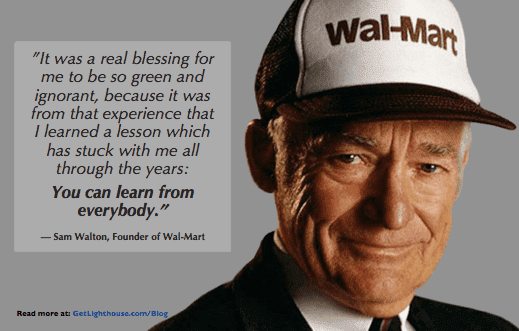
Here's a few other benefits effective listeners experience:
- More great ideas: As Sam Walton learned early on building Wal-Mart, you can learn from everyone and then apply what you learn to improve your business. He was constantly scouting other stores and asking their staff questions for this reason.
- More buy in: Your team is much more likely to support an idea or initiative if they feel like their ideas are a part of it. The same goes for hearing out their concerns.
- More respect: As Dale Carnegie teaches in How to Win Friends and Influence People, listening to others, especially if they're talking about themselves (or their ideas), will make them like you more.
With just a few new tactics, you can join the group of great leaders who are effective listeners. By practicing the ideas below, you'll improve your talking vs. listening ratio in your meetings and interactions with your teams, and boost engagement, buy-in, and the quality of ideas of your team:
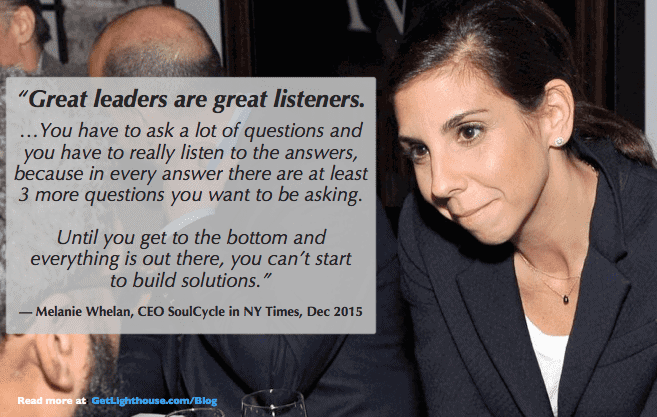
1) Ask more questions
The first step effective listeners take is to ask questions.
Too often, while someone is speaking, people are only thinking about what they want to start saying next. That's a big mistake.
Not only do you miss out on fully hearing what they person is saying, but you rob yourself of the opportunity to fully explore what they're trying to share. Instead, take the time to ask follow up questions.
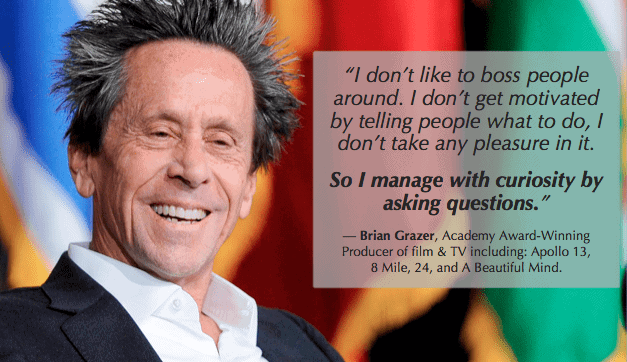
The power of curiosity
One of the most important traits of a good leader is curiosity.
It's so important in fact that Brian Grazer has built an entire career around it. He's produced some of the most well known movies like Apollo 13, Rush, American Gangster, A Beautiful Mind, and 8 mile.
In his book, "A Curious Mind”, on how curiosity was key to his success, Grazer describes how he uses questions as an essential part of his management style:
"I especially think questions are a great management tool when I think someone isn't doing what I would hope they would, or when I think something isn't going in the direction I want it to go.
... Asking questions creates the space for people to raise issues they are worried about that the boss, or their colleagues, may not know about.
Asking questions gives people the chance to tell a different story than the one you're expecting.
Most important from my perspective is asking questions means people have to make their case for the way they want a decision to go.”
Next time you're in a conversation with your team, think about what followup questions you can ask. Does everyone understand the suggestion someone just made? Have they thought through the tradeoffs? Why would that idea work (or not)?
Questions show you're listening, and make sure you don't miss out on something important from a team member.
You can learn more about asking good questions with our post on curiosity here, and this excellent profile on SoulCycle CEO Melanie Whelan that explores the subject as well.

2) Pause...resist the temptation to speak immediately
For many people, silence is incredibly uncomfortable. A break in a conversation for too long can feel incredibly awkward, hence why "awkward silence" has become such a common phrase.
Rather than succumbing to it. Use it to your advantage.
Next time you feel like jumping right in to say something, pause and count to 10 in your head. You're likely to find the other person in the conversation will step in to fill the silence.
If you're a manager, this is hugely powerful. It gives your people space to fully share what's on their mind.
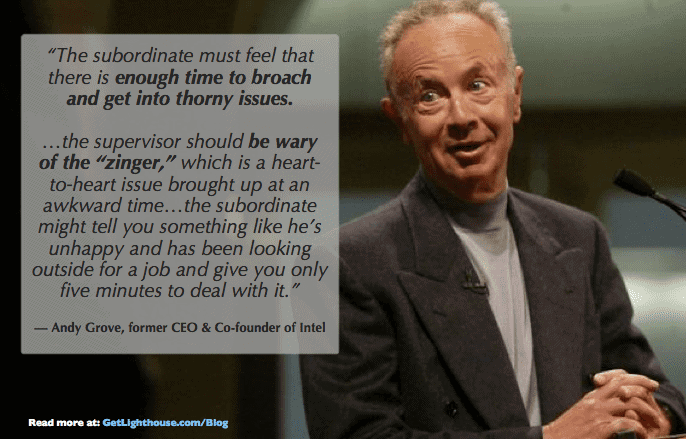
Create space for Zingers
Andy Grove dives deep into the importance of healthy, broad conversations in his management classic, High Output Management.
As described in the image above, he warns managers to be ready for Zingers: a heart-to-heart issue brought up by one of your team members out of the blue.
It takes a lot of courage to bring up tough issues bothering someone. Effective listeners know that a pause is one of the best ways to create space for people to bring it up.
If all you do is rush from topic to topic, you don't give people the space, or time, to get into the really important stuff. That's how you end up blind-sided by a departure, because they never got the chance to really tell you what was bothering them at work.
Next time you're having a conversation with someone, pause for a few moments before moving on to be sure there's not more to say. Don't fall in the trap of saying something like, "Does anyone have anything to add?" and then not actually pausing long enough for anyone to do so.
Remember: you need the silence. As Mark Twain once wrote, "The right word may be effective, but no word was ever as effective as a rightly timed pause."
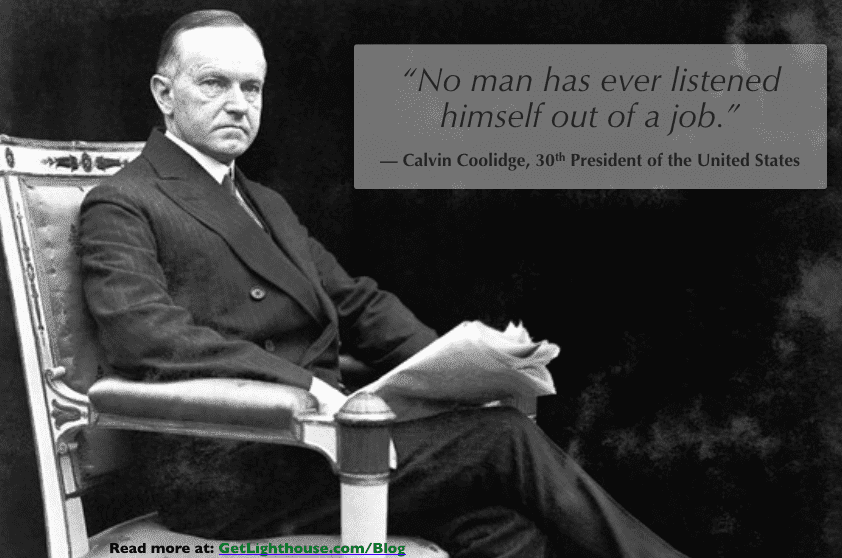
3) Use active listening skills
Asking more questions, and pausing to give people space to share more of their thoughts are great steps leaders can take to become more effective listeners.
However, those steps alone are not enough. You must ensure you really understand what the other person is trying to say. To really take your listening abilities to the next level, you need to sharpen your active listening skills.
Active listening ensures they're truly heard
Despite having evolved complex language, we still struggle as humans to communicate with each other. What one person tries to convey can easily be misunderstood by another person.
As a leader, if you're not careful, you can take one thing away that someone shared, whenever another aspect was really most important to them. The best way to avoid this problem is with Active Listening Skills.
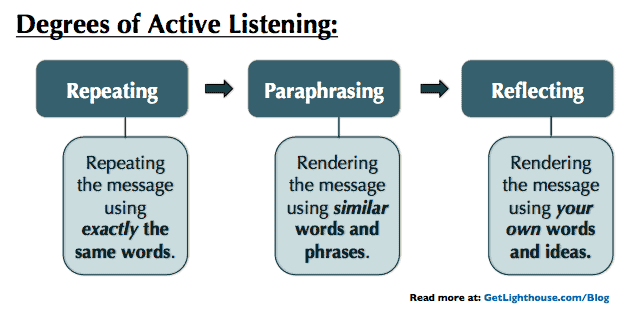
Before moving on from a topic, take a moment to reflect on what they've said. Share with them in your own words what you think they were saying, and see if they agree. Use your listening skills of pausing and asking questions to make sure that you are both in agreement on what you just discussed.
The beauty of this approach is the clarity it brings. Not only have you had a chance to ask them about a topic and dive in, now you're making sure you took away the most important ideas from them.
Active listening skills can save you a lot of headaches down the road. Rather than finding out you were not on the same page days or weeks later, you can clarify everything in the moment. This is how great leaders and effective listeners are able to move faster and more effectively than their poor and average counterparts.

4) Start with your most junior staff
Every leader struggles with the challenge of getting their teams to be open and willing to disagree. Power dynamics make it easy to want to agree with those higher ranking than you. It's where the idea of "Yes Men" comes from.
One of the best ways to combat this is to resist the temptation to give your ideas first. When you share your ideas first, it makes your team want to support your idea, whether to win your favor, or because they believe in you as a leader.
Instead, do as John Cleese suggests in the video above: (I love the whole thing, but the key part is 21:45 - 23:30)
"How clever of the Japanese sometimes to plan that unstructuredness, for example, insisting that the first people to give their views are the most junior so they can speak freely without the possibility of contradicting what's already been said by somebody more important."
By being intentional about the order of who speaks, you can avoid a number of issues:
- As Cleese suggests, it's safer for a junior employee to speak up without having to worry what higher ranking people have said.
- You avoid having one person's ideas dominate just because they raised their hand first.
- You ensure your introverts are given a chance to speak up, too.
It's often cited that diverse teams perform better. This only works if you ensure that a diversity of ideas are actually shared and discussed. To be an effective listener, think carefully about who you ask questions of, and when.

5) Avoid the temptation to give advice
One of the fastest ways to ruin a positive ratio of talking to listening to your team is to start giving lots of advice. It gets you in a mode of telling stories and talking about everyone's favorite subject: ourselves.
We all want cheat codes and easy answers. If you jump ahead and give people advice, you're short circuiting a healthier discussion.
Rather than give them the answer, think about how you can teach them to fish:
- Talk about how and why you made a decision, instead of the decision you made in the past.
- Ask them good questions to help them explore the options fully.
- Discuss frameworks for how they can make a good decision for themselves and apply it later.
You help your team members grow in their careers when you teach them how to make better decisions. Also, if you want to improve on your delegating skills, teaching people how to make good decisions will help you build more trust and task relevant maturity in them.
Lead by example
Not only does giving advice or telling people what to do prevent you from fully listening, it's not actually likely to work. Research shows:
"...whenever someone tells us what to do and how to do it, we respond with a defensive defiance because we want to maximize our personal freedom and decision making."
What works instead? Setting a good example:
"Research on observational learning...suggests that while people will resist unsolicited advice and instruction, they will follow the behaviors of others—especially when there appear to be good and reinforcing outcomes from these behaviors (or beliefs)."
When you give people a good act to follow, you can inspire them to do the same.
Instead of looking at the next opportunity to give out advice and share war stories, consider how you can create teachable moments. Share with them how you arrived at a decision and teach them how to do the same. Your example they see will then reinforce it every day. Introverted managers may find these skills come more naturally, as they are often inclined to listen more than talk.





